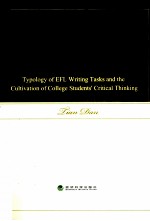
- 作 者:田丹著
- 出 版 社:北京:经济科学出版社
- 出版年份:2012
- ISBN:9787514124187
- 标注页数:209 页
- PDF页数:221 页
请阅读订购服务说明与试读!
订购服务说明
1、本站所有的书默认都是PDF格式,该格式图书只能阅读和打印,不能再次编辑。
2、除分上下册或者多册的情况下,一般PDF页数一定要大于标注页数才建议下单购买。【本资源221 ≥209页】
图书下载及付费说明
1、所有的电子图书为PDF格式,支持电脑、手机、平板等各类电子设备阅读;可以任意拷贝文件到不同的阅读设备里进行阅读。
2、电子图书在提交订单后一般半小时内处理完成,最晚48小时内处理完成。(非工作日购买会延迟)
3、所有的电子图书都是原书直接扫描方式制作而成。
Chapter 1 Introduction 1
1.1 Research Purpose 1
1.2 Research Questions 2
1.3 Research Methodology 3
1.4 Significance of the Study 5
1.5 Outline of the Book 7
Chapter 2 Literature Review 9
2.1 Critical Thinking 9
2.1.1 Definition of Critical Thinking 10
2.1.2 Critical Thinking Skills 12
2.1.3 Critical Thinking in Education 16
2.1.4 Studies on Critical Thinking Home and Abroad 22
2.2 Writing Tasks 24
2.2.1 Types of Writing Tasks 25
2.2.2 Task-based Writing Pedagogy 29
2.3 Action Research 34
2.3.1 A Historical Overview of Action Research 35
2.3.2 Definition of Action Research 38
2.3.3 Classification of Action Research 40
2.3.4 Characteristics of Action Research 41
Chapter 3 Teachers'Perception towards Critical Thinking and Students'Performance in EFL Writing 45
3.1 College English Teachers'Perception towards Critical Thinking 45
3.1.1 Participants 46
3.1.2 Instruments 47
3.1.3 Results and Findings 48
3.2 Assessment of Critical Thinking Abilities in EFL Writing 53
3.2.1 Setting and Participants 53
3.2.2 Instrument 55
3.2.3 Inter-rater Reliability 58
3.2.4 Research Procedure 59
3.2.5 Results and Discussion 60
Chapter 4 The First Round of Action Research 64
4.1 Research Purposes 64
4.2 Planning 65
4.2.1 Transfer from Product Writing to Process Writing 65
4.2.2 Teachers'Written Feedback Focused on Writing Content 66
4.2.3 Teachers'Feedback in the form of Socratic Questioning 68
4.3 Action 70
4.4 Observation 72
4.4.1 Obvious Achievements in Evaluation and Explanation 73
4.4.2 Arising Problems 74
4.5 Reflection 76
4.5.1 Teachers'Feedback in the form of Questions 76
4.5.2 Teachers'Feedback on the Content of Writing 77
4.5.3 Learners'Writing Interest 79
4.5.4 Writing Based on Topic Tasks 80
Chapter 5 The Second Round of Action Research 83
5.1 Research Purposes 83
5.2 Planning 84
5.2.1 Integrating Reading Activities into Writing 84
5.2.2 Writing Based on the Picture Task 86
5.2.3 Brainstorming 87
5.2.4 Peer Feedback 88
5.3 Action 89
5.3.1 Pre-Writing Stage 90
5.3.2 Writing and Revising Stages 91
5.4 Observation 92
5.4.1 Interpretation 92
5.4.2 Analysis 93
5.4.3 Evaluation 94
5.4.4 Inference 95
5.4.5 Explanation 96
5.4.6 Self-Regulation 97
5.4.7 Arising Problems 99
5.5 Reflection 101
5.5.1 Peer Feedback 102
5.5.2 Process-Oriented Writing and Self-Regulation 103
5.5.3 Interest in Writing Tasks 105
Chapter 6 The Third Round of Action Research 108
6.1 Research Purposes 108
6.2 Planning 109
6.2.1 Constructivism and Writing Tasks 109
6.2.2 Task Complexity and Task Difficulty 111
6.2.3 Learning with High Motivation 114
6.2.4 Self-Evaluation 116
6.3 Action 117
6.3.1 The First Stage 117
6.3.2 The Second Stage 118
6.3.3 The Third Stage 119
6.4 Observation 122
6.4.1 Interpretation and Analysis 123
6.4.2 Evaluation 124
6.4.3 Inference 126
6.4.4 Explanation 126
6.4.5 Self-Regulation 128
6.5 Reflection 129
6.5.1 Exploring-Typed Writing Tasks 130
6.5.2 Self-Assessment 132
Chapter 7 Conclusion and Implication 134
7.1 Conclusion 134
7.1.1 EFL Writing and Critical Thinking 134
7.1.2 Writing Task Types and Critical Thinking 140
7.1.3 Various Teaching Approaches and Critical Thinking 142
7.1.4 Writing Task Types and Learners'Enthusiasm 143
7.2 Implications 147
7.2.1 Implications for the National College English Education System 147
7.2.2 Implications for English Teachers 152
7.2.3 Implications for Chinese College Students 167
7.3 Limitation 169
7.4 Further Research 171
Appendix Ⅰ 173
Appendix Ⅱ 176
Appendix Ⅲ 177
Appendix Ⅳ 178
Appendix Ⅴ 180
Appendix Ⅵ 183
Bibliography 185
POSTSCRIPT 208
